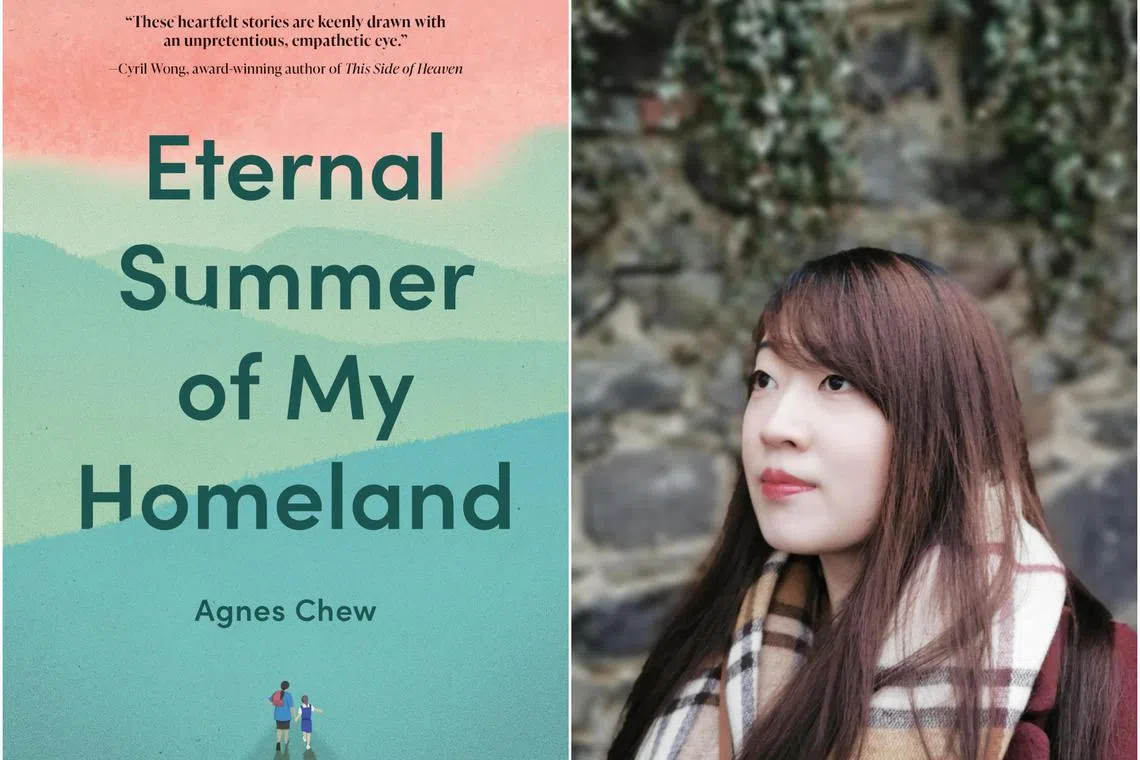Book review: Agnes Chew paints tender portraits of ordinary lives
Sign up now: Get ST's newsletters delivered to your inbox

Germany-based Singaporean author Agnes Chew has put out short-story anthology Eternal Summer Of My Homeland.
PHOTOS: EPIGRAM BOOKS
Eternal Summer Of My Homeland
By Agnes Chew amzn.to/46LimeK
Fiction/Epigram Books/Paperback/184 pages/$22.57/Amazon (
4 out of 5
In this slice-of-life short story anthology, one almost feels as if one is channel-surfing through the lives of ordinary Singaporeans. Timeless and unifying themes of love, loss, death and coming-of-age are deftly woven through the narratives, each dealing with a balancing act between desire and disillusionment.
The plot develops in the headspace of the characters, who often have to grapple with decisions and circumstances that threaten to disrupt normal routines.
A boy grappling with growing pains discovers that wearing braces presents more changes than expected. A woman, estranged from her prodigal son finds solace wandering around and observing life at Changi airport. A freelance graphic designer living alone finds the commotion caused by a neighbouring family invading her reality.
The most heart-warming aspect of the book is its study of people across socioeconomic classes. The lives and different backgrounds of two schoolgirls become increasingly intertwined as they progress through the education system together, a commentary on the rifts that differences in social mobility can create between people.
The author is a Singaporean based in Germany and has previously published short story collection The Desire For Elsewhere (2016). She was the regional winner of the Commonwealth Short Story Prize this year for her short story, Oceans Away From My Homeland.
The book’s passages skip through time, leaving room for allegory as the characters come to terms with the transience of life. In a scene that almost speaks to the writer’s personal experience, a character who fears losing his loved ones while abroad for work thinks: “So much could happen in a year – the possibility of growth, the possibility of loss.”
Chew’s writing has a nostalgic yearning for everyday experiences that people may recall in detail only once they have experienced leaving home.
Although the book attempts to provide an intimate look into the lives of the lower to middle class, this is often undermined by a soft focus. For example, summer flings and dreams of wanderlust are given prominence over other realities briefly mentioned in one story, such as racial marginalisation.
While the book succeeds in its people-centredness, it falls short at critiquing systemic issues. The stories are prone to open-ended resolutions. One story, on a couple’s differing decisions to have children during a climate crisis, lacks the political savvy to make a statement.
Readers who grew up here may feel a kinship to the characters. The conscious efforts to localise the voices and draw up an atmospheric canvas of Singapore as a “home” that exists only in one’s imagination, also speak keenly of the sense of community and familiarity that exists in a small nation.
Overall, Chew’s poetic passages and unpretentious observations create an anthology that pays homage to people living in a system that prioritises pragmatism, but who aspire to find acceptance and a place where they feel a sense of belonging.
If you like this, read: Ministry Of Moral Panic: Stories by Amanda Lee Koe (Epigram Books, 2021, $22.57, Amazon, go to amzn.to/3OfcVxe
This article contains affiliate links. If you buy through these links, we may earn a small commission.


